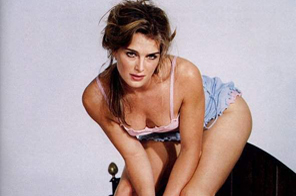Nude Brooke Shields pic kicks up row
NEW YORK: A controversial piece of art based on a 1975 nude photograph of actress Brooke Shields has been removed from a London art exhibit over concerns that it breaches the U.K.'s obscenity laws. The piece shows a 10-year-old Shields, nude, oiled, and heavily made-up, standing in a bathtub and looking directly at the camera.
Britain's Tate Modern gallery said Thursday it had closed a room at its new blockbuster exhibition that contains a 1983 piece by American artist Richard Prince based on a nude photograph of actress Brooke Shields taken in 1975 when she was 10. The Tate acted after police launched an investigation.
The Tate Modern took down the provocative 1983 piece called "Spiritual America" by American artist, Richard Prince, after Metropolitan Police launched an investigation.
The artwork was based on the infamous image of Shields taken by photographer Garry Gross.
The work was removed from the Tate Modern exhibit Pop Life: Art in a Material World. The temporary closure of the room where the photo was exhibited comes after the Metropolitan Police said they were investigating to see if the artwork might violate obscenity laws.
The Obscene Publications Committee, a division of the Metropolitan Police department in London, requested the temporary removal of the piece, on the grounds that it might violate the Obscene Publications Act of 1964, which states its intention to "strengthen the law for preventing the publication for gain of obscene matter."
Due to the photograph's controversial nature, the Tate Modern says it sought legal advice before deciding to display the piece and planned to display it behind a curtain in a dark room with a sign in front warning viewers of "challenging" material.
"The officers have specialist experience in this field and are keen to work with gallery management to ensure that they do not inadvertently break the law or cause any offence to their visitors," Scotland Yard said in a statement.
The Tate agreed to comply with the request.
"The room has been temporarily closed. We are in discussion with the police," said a Tate spokesman.
The police have been working with the Crown Prosecution Service, that works with the police and the courts, to determine whether or not the piece should go back on display.
"In these cases we take a bit of a pragmatic approach ... It's all about the context...You can't take something in isolation," said Annabelle McMillan, a Crown Prosecution Service spokeswoman.
"It comes down to the issue of 'Is it art or is it criminal?' which is complicated."
Children's rights advocates and Christian leaders do not agree that it is such a complicated issue.
"Don't use a child in an exploitative way when they cannot give consent. The line has been crossed when you use a child as an object or when you show provocative or indecent photos of any child. That is never art," said Michelle Elliot, founder of Kidscape, who was concerned that the photograph might attract pedophiles.
"The reality is that this was an indecent image of a child who was 10 that was used to bring in the punters," Elliot said.
Mike Judge, the head of communications for the Christian Institute, had a similar opinion. "I'm very concerned about a creeping acceptance of pedophilia," he said.
"Art is where you can look at something and be lifted in your soul about the great works humans can accomplish, but to look at something and see the depths to which humility can sink, that is not art."
The photo was originally taken by Garry Gross, a U.S. photographer, in 1975 with permission from Shields' mother to be displayed in a Playboy publication called Sugar 'n' Spice. In 1981, Shields attempted to buy back the negatives, but was unsuccessful.
Prince, using the original image with Gross' permission, simply took a photo of Gross' photo, framed it and called it "Spiritual America." The piece was originally displayed anonymously in a New York store front and then, in 2007, at the Guggenheim in New York
Brooke Shields started modeling and acting at a young age and starred in several movies, including "Pretty Baby" in 1978, where she played a child prostitute in a role that also sparked charges of exploitation.
"Pop Life: Art in a Material World," which, according to the Tate Modern press office, "proposes a rereading of one of the major legacies of Pop Art," opened to the public today. It features a slew of provocative pieces, including Jeff Koons' display, "Made in Heaven," which displays several self-portraits of genitalia and the artist's graphic sexual exploits, as well as Takashi Murakami's sculpture of a big-breasted, blue-haired female skipping a rope made of her own breast milk. Other artists in the exhibit include Andy Warhol and Damien Hirst.






